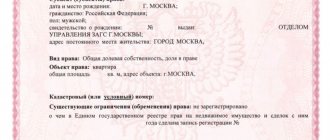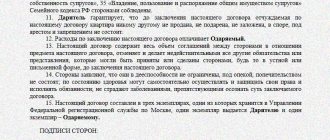Donating a share is perhaps the easiest way to transfer part of a residential property to a relative or any other person. The main advantage is that you usually don’t need to ask anyone for permission, and the recipient receives rights to square meters only for signing the contract. Read about these and other subtleties of giving in our material.
What is a share in an apartment
An apartment can belong to several owners at once, being in their joint or shared ownership. In Russian law these are two different concepts.
What you need to know about shared ownership
- Joint ownership means that the apartment is not divided into shares. For example, a couple bought and simply registered a living space for two, or a family of four privatized housing.
- Shared ownership is the property of two or more people on the basis of common ownership with the determination of the share of each owner. There are many options for its appearance: spouses or close relatives can divide the housing into shares, the apartment was inherited by several relatives at once, etc.
Children can also be the legal owners of part of the home. For example, the basis for allocating a share in an apartment to a minor is its purchase using maternity capital. In this case, the child’s share in the apartment cannot be less than what is due to him by law.
After allocating a share, it must be registered in the Unified State Register of Real Estate.
In the documents, the shares are designated as ½, ⅓, ¼ of the apartment. Moreover, each owner owns not a specific part of the housing, but the entire apartment. He has the right to use any of her rooms, every centimeter, at will. Usually, share owners themselves agree on who will live in which premises. In cases where the issue cannot be resolved peacefully, the court helps. In particularly difficult situations, the share is allocated in kind, if, of course, there are technical conditions for this (it is possible to equip a hotel entrance and a personal bathroom in the room).
The concept of shared ownership
A share is an abstract given, a set of rights in relation to a specific thing. Shared ownership is considered as a concept that is closely related to the concept of common property (such a right arises in relation to a thing that is indivisible by nature or by law, or in relation to a thing that is divisible, but owned by several persons in cases where this is directly established either by law or by agreement sides). It should be noted that, in contrast to joint ownership (which by default occurs, for example, between spouses), the shared ownership of a thing by several persons presupposes a strict definition of the shares of co-owners .
The size of shares in shared ownership can be established taking into account the provisions of the law or on the basis of an agreement concluded between the co-owners . If the size of the shares is not determined, it is recognized as equal (as follows from paragraph 1 of Article 245 of the Civil Code of the Russian Federation).
Who has the right to give and who is prohibited
To donate a share of ownership in an apartment, you need to meet several requirements:
- Own housing and a share, the right to it must be registered with Rosreestr;
- Be of legal age;
- Be competent and mentally healthy.
Many people mistakenly believe that making such a generous gift is as difficult as selling part of the home, because other owners may object. However, in this regard, donating a share in an apartment and selling it are two different things.
To donate a share, the consent of others is not required, because it is a gratuitous transaction. That is, the donor does not receive money for it.
Sales fall into the category of compensated transactions, therefore, the disposal of shared property is permitted only with the consent of all its owners. For example, a husband will not be able to sell a share in an apartment, bypassing his wife. Moreover, this applies not only to the sale of a share in an apartment, but also to the redevelopment of housing.
Methods
The donation of part of the housing occurs by concluding an agreement. However, sometimes citizens have to go to court. The reason is the death of the donor. If the recipient did not have time to register ownership, then the property of the testator is included in the inheritance. The legal successors of the property are the family members of the deceased subject.
Example. The plaintiff went to court. He asked to recognize the deed of gift as concluded, and the certificate issued by the notary as invalid. The plaintiff also asked to cancel the certificate of ownership. Justification of the requirements - a gift agreement was drawn up between the plaintiff (son from his first marriage) and the late citizen K. But the plaintiff did not have time to register ownership of the premises due to the death of the donor. The defendants were the heirs of the deceased subject. They knew about the conclusion of the gift agreement, however, they turned to a notary to register the inheritance. As a result, the plaintiff lost the property donated to him. The legal successors registered the ownership rights with the Federal Registration Service of the Omsk Region. Two defendants admitted the claims. Another claimed that he knew nothing about the existence of a gift agreement. Moreover, the agreement was not certified by a notary. Therefore, he asked to dismiss the claim. However, the court did not agree with the defendant's opinion. The deal was concluded before amendments were made to Federal Law No. 172-FZ. Therefore, notarization of the agreement was not required. The claims were satisfied.
List of persons who do not have the right to donate shares:
- Minor children;
- Citizens who are undergoing treatment, maintenance and education in hospitals, nursing homes, boarding schools, and orphanages. Their relatives will also not be able to give a share to anyone;
- Representatives of young children and incapacitated citizens;
- Owners of a share of an apartment pledged to credit institutions (the bank gives permission only in exceptional cases);
- Owners whose share is less than the minimum amount established by law. We are talking about the minimum living space per person. The norms are prescribed in regional regulations and vary from 8 to 15 square meters. m. In this case, you cannot either sell a share in the apartment or donate it as a gift;
- Commercial structures that decided to make a gift transaction among themselves. But a legal entity can make a similar gift to an individual and vice versa.
Presence of encumbrances and consent of the donee
If an apartment, part of which is donated to a loved one or a stranger, is under an encumbrance, these nuances must certainly be noted in the deed of gift. Those who are preparing to accept part of the property as a gift from strangers should definitely find out all the details about the legal purity of the property.
If the owner has, for example, obligations to the bank, and the donated real estate or a separate share serves as collateral, the consent of the creditor to a change of owner is mandatory.
On the other hand, no one is obliged to accept real estate as a gift - the recipient has every right to refuse the gift, therefore the agreement clearly reflects the recipient’s consent to accept the property. Sometimes it is cheaper to refuse a gift, for example, that is under an encumbrance, than to later deal with how to legally “clear” the real estate. Signing a deed of gift, like any other document, must be a conscious decision; only under this condition will both parties be completely satisfied.
Who can you donate a share to?
By law, a deed of gift can be issued to almost anyone. You can transfer a share in an apartment free of charge to a relative, friend, good acquaintance or a complete stranger. There are no obstacles to this, even if there is a minor co-owner.
The transaction has its own characteristics when it comes to a gift to a minor. Until the age of 14, a child will not be able to sign a donation agreement for a share of the apartment; his parents must do this for him. And from 14 to 18 years old, children sign themselves, but with the permission of their legal representatives. Otherwise, the transaction will be considered illegal.
And yet, the legislation has provided a list of persons to whom it is prohibited to give shares in apartments in order to combat corruption:
- Employees of educational, medical and social institutions, if the donor is their client or a relative of the client;
- Employees in state, municipal bodies, state banks, if the gift is somehow related to the performance of their official duties.
Contract form
The basic requirements for the form of a gift agreement are presented in Article 574 of the Civil Code. It depends on the type of contract, its parties, as well as the subject of the gift. The real contract of gift, which is made by transferring property to the donee, is concluded orally . The exceptions are contracts in which:
- the subject of the donation is real estate that requires state registration of property rights;
- The donor of movable property worth more than three thousand rubles is a legal entity.
Attention
Such transactions must be concluded only in writing . In addition, contracts containing a promise of donation in the future (consensual) require written form.
Separate requirements for the form of a gift agreement are contained in Articles 389 and 391 of the Civil Code, when the subject of the gift is a property right in relation to a third party (assignment of a claim) or release from a property obligation to a third party (transfer of debt).
Assignment of a claim or transfer of debt, which are based on transactions completed either in simple written form or subject to state registration, are made accordingly, either in simple written form , or registered in the manner established for such transactions.
Do I need a notary to donate a share?
- A notary is required: there are several owners in the apartment with their shares, one or two decided to give them to someone else. Notarized consent is required from the spouse if the purchase of a share in an apartment or house occurred during marriage.
- A notary is not needed: all owners give shares in one transaction. The notarial consent of the spouse is not necessary if the share was given to the owner before marriage, was given as a gift, acquired as an inheritance, was privatized during marriage, or a marriage contract was drawn up, which stipulated the details of ownership of the property.
Other owners: when their consent is required
Many questions are related to whether consent to donate a part from the remaining homeowners is always necessary. If the deed of gift concerns the transfer of additional “squares” to one of the owners, who, thus, expands his share, the consent of the other owners is not at all necessary.
In situations where an apartment is given to a stranger, notarized consent from other owners is required. Otherwise, the remaining owners will easily get the transaction declared invalid.
However, if the property is shared, and this part is allocated in kind, the owner can dispose of it absolutely freely, without obtaining the consent of the other owners.
What documents are needed for the deed of gift?
For a share donation agreement, you will need the same documents as for the sale of an apartment:
- Documents on the basis of which the share was received: certificate of inheritance, purchase and sale agreement, etc.;
- Extract from the Unified State Register of Real Estate for residential premises;
- Extract from the house register and financial and personal account;
- Technical passport or explication of the apartment and floor plan;
- Passports of the donor and recipient.
To quickly order an extract from the Unified State Register, use the Unified State Register Service. It is enough to indicate the cadastral number or address of the property. And you will have the finished extract in 30 minutes.
In special cases it is necessary to prepare:
- Marriage certificate;
- Child's birth certificate;
- Notarized consent of the donor's spouse;
- Documents about the relationship of the parties, if the gift is intended for a close relative;
- A certificate from a psychoneurological clinic confirming the legal capacity of the parties.
Text: Olesya Moskevich







